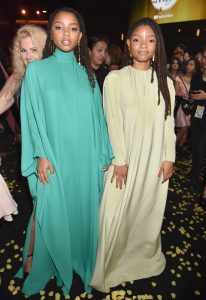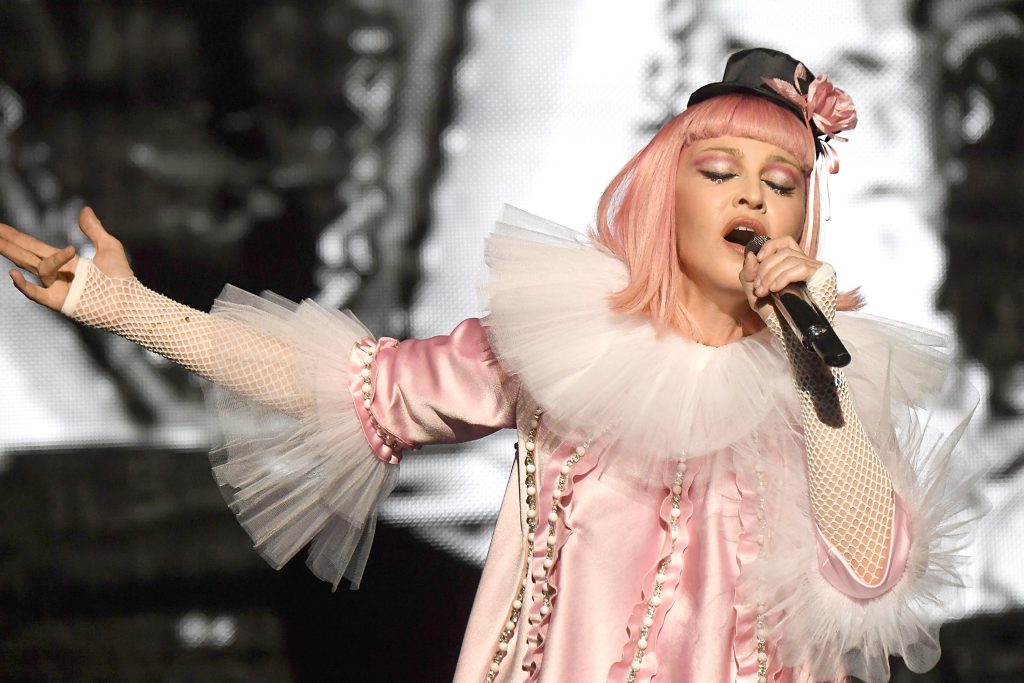August 8, 2021
by Carla Hay

Directed by Liesl Tommy
Culture Representation: Taking place from the 1950s to 1970s, in various cities in the U.S. and Europe, the dramatic film “Respect” about music legend Aretha Franklin features a predominantly African American cast of characters (with some white people) portraying people who were connected to Franklin in some way.
Culture Clash: Franklin soared to the greatest heights in show business, but her personal life was troubled with alcoholism, abusive relationships, and being haunted by childhood traumas.
Culture Audience: Besides appealing to the obvious target audience of Aretha Franklin fans, “Respect” will appeal primarily to people interested in formulaic celebrity biopics and don’t mind if the pacing and story are disappointingly uneven.

It’s indisputable that Aretha Franklin is one of the greatest music legends of all time. She won every possible major award for singing. She influenced millions of people and had numerous iconic hits. She was celebrated for other areas of her life, such as her civil rights activism and charitable work. And she rightfully holds the title of Queen of Soul. Franklin (who was 76 when she died of pancreatic cancer in 2018) deserves a biopic that does justice to her extraordinary life. Unfortunately, the woefully muddled “Respect” is not that movie.
Simply put: In this movie, the music soars, while the drama often bores. At 144 minutes long, “Respect” is an uneven biopic that makes a number of baffling and terrible choices in how to present Franklin’s life. “Respect” is the feature-film directorial debut of Liesl Tommy, who has extensive directorial experience on Broadway and in television. Tracey Scott Wilson, who’s been a playwright and a TV writer, also makes her feature-film debut as a screenwriter in “Respect.” Their lack of feature-film experience might have hurt the movie.
“Respect” has the benefit of a very talented cast, including two cast members (Jennifer Hudson and Forest Whitaker) who have won Oscars for their acting. Hudson, who portrays Aretha Franklin in the movie, is an excellent, Grammy-winning singer in her own right. She has standout moments in “Respect” when she sings Franklin’s songs with a fiery passion that’s admirable. But it’s hard to go wrong with the movie’s musical numbers when an outstanding singer like Hudson gets to belt out Aretha Franklin classics that Hudson was singing years before she got cast in this movie.
Where the movie stumbles is how it drags down too many scenes with sluggish pacing, mediocre acting and uninspired dialogue. In addition, “Respect” is often tone-deaf and borderline irresponsible when it comes to depicting racial inequalities and racism in a movie that mostly takes place in the U.S. during the era of legal racial segregation and the civil rights movement that helped make this segregation illegal. It’s as if this movie was made by people who want to forget the racism experienced by Aretha Franklin and other black people in America, and would rather have scene after scene of Aretha Franklin getting abused by her African American husband.
One of the biggest mistakes is that the movie—which is mostly told in chronological order from the 1950s to 1970s (with some flashbacks)—spends the first 20 to 25 minutes focusing only on Aretha as a pre-teen, beginning in 1952 when she was 10 years old. As important as it is to depict Franklin’s childhood, it didn’t need to take up this much screen time in a feature-length movie. This lapse in judgment in spending too much time on Aretha’s childhood seems to be because the filmmakers wanted to showcase the impressive singing talent of Skye Dakota Turner, who is fantasic in her role as a young Aretha.
However, the childhood scenes are very repetitive in showing that Aretha as a child was trotted out like a show pony by her domineering minister father, Rev. Clarence LaVaughn “C.L.” Franklin (played by Whitaker), to sing for audiences whenever he told her to sing. The audiences could be in places as varied as a church, a nightclub or a house party. C.L. knew early in Aretha’s childhood that Aretha was going to be a star, and he was going to do everything possible to make it happen.
The movie also shows how Aretha was affected by her parents’ separation when she was a child. By the time the movie begins in 1952, the couple had been separated for four years. Her mother Barbara (played by Audra McDonald) moved out of the family home, which can be intepreted as either abandonment or as a woman who didn’t have the money and resources to fight for child custody against a more powerful spouse.
Aretha’s father had custody of Aretha and her siblings from this marriage. These siblings included older sister Erma, older brother Cecil and younger sister Carolyn. The actors portraying these siblings are Kennedy Chanel as young Erma, Saycon Sengbloh as adult Erma, Peyton Jackson as young Cecil, LeRoy McClain as adult Cecil, Nevaeh Moore as young Carolyn and Hailey Kilgore as adult Carolyn.
C.L.’s mother (played by Kimberly Scott), who has the name Mama Franklin in the movie’s credits, helps raise the children. She is a kind and loving authority figure in the children’s lives, but not as warm and welcoming to the kids’ mother. Barbara is a mysterious and intermittent presence who’s treated like a pariah by C.L. and his mother. There’s a lot of tension when Barbara comes to visit the children.
The reason for the breakdown in the marriage is stated only as C.L. spending too much time away from home as a traveling minister. His alleged infidelities are not mentioned in the film, nor is it mentioned that he fathered a daughter named Carl Ellan (born in 1940) with a 12-year-old girl from his congregation named Mildred Jennings. (It’s a widely reported story that has not been disputed by the Franklin family.)
It is mentioned during an argument scene that C.L. abandoned his first wife and family and then moved on to Barbara, who was his second wife. Barbara and C.L. were never legally divorced. While still legally married but separated from Barbara, C.L. began an on-again/off-again relationship in 1949, with a gospel singer named Clara Ward (played by Heather Headley), who was his longtime companion until her death in 1973. Although she and C.L. were never married, they were known as the reigning couple of New Bethel Baptist Church in Detroit, where C.L. was a very influential member of the community.
Even though C.L. was the more dominant parent in Aretha’s life, the movie shows that her mother Barbara had a huge influence on Aretha as a singer and as a musician. The movie depicts this mother and daughter spending happy times singing together, often while Barbara played the piano. Aretha also became a skilled pianist.
Tragically, Barbara died of a heart attack at the age of 34 in 1952. The movie shows how Aretha was devastated by her mother’s death, but the movie doesn’t mention how Barbara died. When C.L. reluctantly tells Aretha the news about Barbara’s passing, Aretha doesn’t even ask what caused her mother’s death. It’s an example of how this movie sloppily leaves out realistic details and how it treats some of Aretha’s family members more like plot devices than real human beings.
Aside from having a messy and fractured family life, Aretha was also profoundly affected by childhood sexual abuse. It’s depicted in a non-explicit way in the movie as Aretha, at 10 or 11 years old, being the victim of statutory rape by a guy in his late teens or early 20s who was a guest in the Franklin home during a house party. Later, there’s a brief flashback to Aretha as a 12-year-old, pregnant with her first child: a boy named Clarence (named after her father), who was born in 1955.
For years, Aretha refused to publicly say who was the father of her son Clarence. In 1957, she gave birth out of wedlock to a second son named Edward, whose father was Edward Jordan. According to several reports, Aretha wrote in her will that Jordan was also the father of Clarence.
She went on to have two more sons: Ted White Jr. (born in 1964, from her first marriage to her manager Ted White), and Kecalf Cunningham (born in 1970, from a relationship she had with her tour manager Ken Cunningham). In the movie, Joel Xavier Alston and William J. Simmons portray Clarence; Christopher Daniel and Chase Burgess portray Edward; and Malaki Sample portrays Ted White Jr.
Aretha was a high-profile supporter of the U.S civil rights movement, and the movie correctly shows that she and her father C.L. were allies of Dr. Martin Luther King Jr. (played by Gilbert Glenn Brown), the civil rights leader who was assassinated in 1968. However, the movie makes it look like Aretha never experienced racism from white people. It’s really insulting to viewers’ intelligence that the filmmakers of “Respect” make a big deal out of Aretha’s support of the civil rights movement and yet refused to show why the civil rights movement existed in the first place.
Aretha was born in Memphis and grew up in Detroit. She spent years touring in the U.S. during the ugly period in American history when racial segregation was legal. Black people and other people of color who traveled in certain parts of the U.S. experienced human rights violations, especially in places where people were segregated by race. Anyone who wasn’t white in a “white only” area could be subjected to hateful abuse or worse. And yet, the movie completely erases these racist experiences from her life.
It wouldn’t have been so hard to have something as simple as a scene of Aretha traveling somewhere while on tour and seeing signs that said “White Only” or “Colored Only,” which were prevalent in these racially segregated areas. It’s grossly inaccurate for any movie about an African American entertainer who toured the U.S. during the segregation era to not show this despicable part of American history. And the fact that “Respect” was written and directed by black women makes it even more mind-boggling that they would leave out this truthful part of Aretha’s life. Aretha might have been a superstar, but she still experienced racism, just like any black person in America.
In fact, the movie makes it look like all the white people whom Aretha ever encountered in her life went out of their way to be nice to her. And that might have been true on a business level when she had some type of fame and people were making money off of her, but not in her everyday life as an African American female, especially before she became famous. A large part of this movie is about before Aretha was a celebrity. That doesn’t mean this movie had to make all white people she encountered look like racists, because that would be inaccurate. But it’s also very wrong and insulting to the civil rights movement to depict Aretha Franklin’s life as being some kind of concocted fantasy where she was immune to racism.
The biggest racist and the biggest villain in the movie is Aretha’s first husband Ted White (played by Marlon Wayans), whom she married in 1961, at age 18, and who became her manager right around the time that she signed her first record deal. He is written as the worst possible stereotype of an angry black man. He’s abusive, violent and misogynistic. In case it isn’t clear that Ted is also a racist, he frequently spews derogatory racist names for white people and black people whenever he wants to feel important.
Ted flies into a rage when he sees other men, especially white men, admiring Aretha. There’s a scene in a hotel room where Ted verbally and physically attacks one of Aretha’s recording session musicians (a white man), who tries to talk Ted out of canceling a recording session that is going well. Ted wants to cut short the recording session, all because Ted didn’t like the way one of the musicians was touching Aretha.
Of course, you don’t have to be a psychiatrist to see (because the movie shows it) that Aretha’s attraction to Ted was partly to due to rebelling against her father (who greatly disapproved of Ted) and partly because she wanted a husband who was controlling like her father. Like many abusive partners, Ted has a charming side that he uses to keep his partner hooked on the relationship. Aretha is depicted as someone who was very insecure with low self-esteem, except when it came to showing her talent.
Although not as toxic as Ted, Aretha’s father C.L. is also portrayed as having an unhealthy relationship with Aretha. For example, in a scene where Aretha was a Columbia Records artist, she tells C.L. that she doesn’t have hit songs because “you don’t make good songs for me.” In response, C.L. slaps her in the face. The movie is filled with hokey lines, such as when Aretha’s father C.L. says to her when she fires him as her manager and replaces him with Ted: “You’re going to beg to take me back, but I won’t!”
Whitaker isn’t in the movie as much as Wayans, but both C.L. and Ted are depicted as two-dimensional control freaks. Ted manipulates Aretha to stay with him, by saying that they both have personal demons and only she can help him control his demons. It’s made very clear throughout the story, because the movie shows viewers through flashbacks, that Aretha’s alcoholism and her relationship problems are the result of her dysfunctional childhood and her trauma from sexual abuse.
The movie accurately shows that Aretha wasn’t an overnight sensation. During the early years of her career, when Aretha was signed to Columbia Records, she had trouble finding her identity as a singer. She sang mostly R&B music, but she couldn’t get any mainstream crossover hits from any of the albums that she released on Columbia. Columbia Records chief John Hammond (played by Tate Donovan) is depicted as friendly but not very attuned to Aretha on an artistic level.
In addition to her mother’s musical influence, Aretha had early musical guidance from Reverend Dr. James Cleveland (played by Tituss Burgess), who has a small role in the film, mostly playing the piano while Aretha sings. It’s such a small role that many viewers who don’t know Aretha’s history might forget that this character is in the movie. The character is written so generically that it’s a waste of Burgess’ talent.
Mary J. Blige has a brief supporting role as singer Dinah Washington, a friend and inspiration to a young Aretha. In one of the movie’s several melodramatic scenes, Aretha as a young adult in 1963 (before she was famous) is singing at New York City’s Villlage Vanguard nightclub, where Dinah is in the audience. Just as Aretha begins singing one of Dinah’s songs as a tribute, Dinah loses her temper and flips over the table where Dinah is sitting.
Dinah yells at Aretha in front of the crowd: “Bitch! Don’t you ever sing the queen’s songs when the queen is in front of you!” It’s the kind of scene that you might see in a Tyler Perry movie. Later, in the dressing room, Dinah has calmed down, and she offers this advice to Aretha: “Find the songs that suit you. Until you do that, you ain’t going nowhere.”
Aretha’s career vastly improved after she signed to Atlantic Records in 1966. Under the musical mentorship of Atlantic Records co-founder Jerry Wexler (played by Marc Maron), she found the songs that suited her. These hits included “Respect” (a cover version of an Otis Redding song), “(You Make Me Feel Like) A Natural Woman” and “Think,” all of which Hudson performs in the movie.
And for the first time in her career, Aretha’s session musicians were all white, which initially didn’t sit well at all with her racist husband/manager Ted. There are mutliple scenes where Ted and Jerry clash over the race of Aretha’s backup musicians. Ted wanted to stick with the black musicians Aretha had been working with for quite some time, while Jerry says these musicians are inferior to the white musicians whom Jerry wanted to have for Aretha’s backup band.
However, Ted couldn’t argue with the success that came when Aretha started getting big hits and became a major star. They moved to New York City and led a celebrity lifestyle that hid from the public a lot of abuse that Ted inflicted on her behind the scenes. The movie shows that after Ted brutally assaulted Aretha during a vicious fight, she left him to go back to her family in Detroit on at least one occasion. But he sweet-talked his way back into her life and took a lot of credit for her success. The couple eventually divorced in 1969.
Jerry Wexler is portrayed as a shrewd wheeler dealer who was skilled with artists not just on an artistic level but also on a business level. He’s credited with bringing Aretha to FAME Studios in Muscle Shoals, Alabama, in 1967, to record one of her most well-known songs: “I Never Loved a Man (The Way I Love You),” the title track of her album released that year.
For a movie about this music legend, there’s the expected number of hits, but they’re presented in a very superficial, jukebox style. One minute, Aretha is at home singing along with some family members to Redding’s “Respect” and saying how she wanted to record a version of the song, even though Ted and some other people were skeptical. The next minute, she’s recorded the song, and it’s a big hit.
There is some screen time (but not enough) showing how Aretha crafted the songs in the recording studio. Most of her hits were written by other songwriters, but she played piano and helped arrange many of her song melodies. The movie gives most of the credit for Aretha’s transformation in the recording studio to Jerry and the white musicians he hired to be her backup band. Jerry and these musicians are depicted as showing Aretha a different way of approaching music than what she was previously doing in a recording studio.
Aretha had the talent all along, but the movie has somewhat of a “white savior” narrative that Jerry and these musicians took her career to hitmaking levels. Eventually, she had a racially integrated band, but the movie presents any of her male co-workers as perceived problems for bullying Ted, who was paranoid that other men would try to seduce Aretha or try to undermine Ted’s control over her. Meanwhile, the movie shows that Ted was cheating on Aretha.
“Think” was one of the hits that Aretha wrote, but the behind-the-scenes story about the song is reduced to it being inspired by her abusive relationship with Ted, who got a co-songwriting credit. Later in the movie, when they have an argument, Aretha expresses regret about giving him that songwriting credit because she says he hardly worked on the song. Overall, the movie does a disservice in telling the stories behind Aretha’s biggest hits.
The story behind “(You Make Me Feel Like) A Natural Woman”—written by Carole King, Gerry Goffin and Wexler—is left completely out of the movie, even though the song is unquestionably one of Aretha’s greatest anthems. The closest that the movie comes to acknowledging who wrote “(You Make Me Feel Like) A Natural Woman,” is during the end credits: There’s a clip showing the real Aretha performing the song during the 2015 Kennedy Center Honors, where Carole King was an honoree and rapturously reacting in the audience. It just serves as a reminder that no scripted project with actors can truly capture the musical genius of the real Aretha.
“Aint No Way,” written by Aretha’s younger sister Carolyn, is performed in the movie, which leaves out the story behind that song too. Carolyn was an “out of the closet” lesbian to her friends and family, and the song was about the secret love she had for another woman. The “Respect” movie does not discuss the personal lives of Carolyn and Erma, who were longtime backup singers for Aretha. And their personal lives didn’t have to be in this movie, but the movie erases a lot of the LGBTQ presence in Aretha’s life.
According to author David Ritz’s comprehensive 2014 biography “Respect: The Life of Aretha Franklin,” gay and lesbian couples and hookups were very common among the performers and employees of the gospel tours that Aretha did in her youth, and they were among her earliest exposures to LGBTQ people. The closest that the movie comes to acknowledging the LGBTQ community that was part of Aretha’s life is during the movie’s 1952 opening scene at a Franklin house party, where two men are very briefly seen flirting with each other and giving each other an amorous embrace.
It’s as if the “Respect” filmmakers went so far out of their way to erase certain truthful aspects of Aretha’s life, in order to not to offend certain people who want to pretend that these facts of her life did not exist. Instead, the “African American diva with the abusive husband” narrative is one they obviously felt comfortable pounding into the story repeatedly. Aretha Franklin was married to Ted White for only eight years. She experienced racism for a lot longer than that, but you’d never know it by what the filmmakers chose to put or not put in this movie.
After Aretha and Ted broke up, Aretha’s older brother Cecil eventually took over her business affairs, but that’s barely acknowledged in the movie. Her siblings are just treated as side characters who are there to serve Aretha or get yelled at when Aretha is angry and/or drunk. More than once in the film, Aretha accuses her sisters of being jealous that she’s a more successful singer than they are. If you’re looking for any insightful Franklin family scenes in this movie, forget it. Her biological family members are shamelessly and unfairly written as supporting characters in a soap opera.
Aretha’s affair with her tour manager Ken Cunningham (played by Albert Jones) is portrayed as partly getting revenge on Ted for his infidelities and partly because Aretha turned to Ken out of loneliness. Unlike Ted, Ken is portrayed as a good guy. However, Ken got involved with Aretha during the worst of her alcoholism, so the relationship was doomed, even though the movie rushes in an “Aretha gets sober” redemption arc toward the end. The movie doesn’t show Aretha and Ken’s breakup, because the film ends in 1972, when Aretha recorded her “Amazing Grace” live gospel album, which remains the best-selling album of her career. (“Respect” also mentions the “Amazing Grace” documentary film that was made about recording this album.)
Hudson’s portrayal of Aretha is not horrible, but it’s far from an award-worthy performance. She excels during the musical numbers, but her dramatic scenes with some of the actors (especially with Wayans) are often mired in stilted, awkward pauses. Hudson sometimes has the real Aretha’s vocal cadence when she speaks, but other times she drops it and talks like Jennifer Hudson.
The scenes about Ted’s jealousy and abusiveness wallow in tacky melodrama. There’s a scene at an Aretha concert where Ted gets angry backstage when he sees that some of Aretha’s overzealous fans are trying to climb on stage. Instead of letting the professional security team handle it, Ted storms out on stage in the middle of the performance and acts like he’s about to body slam anyone who gets close to Aretha. And when Ted sees the way Aretha and Ken look at each other when they first meet, he’s ready to pick a fight with Ken.
One of the worst scenes in the movie is when a drunk Aretha falls off of the stage during a 1967 concert in Columbus, Georgia. This happened in real life, and she broke her arm in this incident. In the movie, no broken bones are mentioned, but she’s shown unconscious on the floor, like a rag doll. The entire scene is so clumsily filmed and melodramatic, it comes across as an unintentional bad parody.
As for her civil rights activism, because this movie inaccurately makes it look like Aretha never experienced racism first-hand, she’s portrayed as somewhat of a bystander in the civil rights movement. There’s a scene where Aretha, as a grown woman, asks her father for permission to march in civil rights protests, but he says no. There’s a scene where Aretha is shown getting the news about Martin Luther King Jr.’s murder and later singing at his funeral. And there’s a scene that’s set in 1970, with Aretha giving a press conference where she talks about how imprisoned activist Angela Davis needs to be set free. There are no scenes of Aretha or anyone in her family actually experiencing racism directly, even though everyone knows it happened in real life.
Those are just some examples of how this movie disrespectfully chopped up and/or tossed aside aspects of Aretha’s life, in service of a warped narrative that Aretha never experienced racism, and the only people who ever hurt her were black men. In portraying Aretha’s illustrious and complicated life, this very misguided biopic took the tabloid route and made approximately half of the screen time be about Aretha in an abusive relationship with a man she was married to for eight of the 76 years that she lived.
Was she flawed? Did she make a lot of mistakes? Of course. But she deserved much better than a movie called “Respect” was willing to give her. Fortunately, there are several well-written Aretha Franklin biographies, interviews that she gave over the years, and (of course) her timeless music that give a more meaningful and more accurate picture of who she really was.
Metro Goldwyn Mayer Pictures will release “Respect” in U.S. cinemas on August 13, 2021. A one-night-only sneak preview of the movie was held in U.S. cinemas on August 8, 2021.











